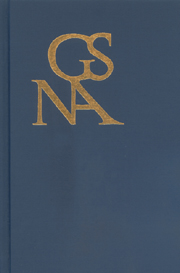Book contents
- Frontmatter
- Contents
- Towards a German Romantic Concept of the Ballad: Goethe's “Johanna Sebus” and Its Musical Interpretations by Zelter and Reichardt
- “Trübe” as the Source of New Color Formation in Goethe's Late Works Entoptische Farben (1817–20) and Chromatik (1822)
- The Myth of Otherness: Goethe on Presence
- The Transformation of the Law of Nations and the Reinvention of the Novella: Legal History and Literary Innovation from Boccaccio's Decameron to Goethe's Unterhaltungen deutscher Ausgewanderten
- “Hear him! hört ihn!”: Scholarly Lecturing in Berlin and the Popular Style of Karl Philipp Moritz
- Hypochondria, Onanism, and Reading in Goethe's Werther
- Judex! Blasphemy! and Posthumous Conversion: Schiller and (No) Religion
- Esoterik der “Macht, die über uns waltet und alles zum Besten lenkt”: Das Wissen vom Anderen in Goethes Wilhelm Meisters Lehrjahre
- Goethes Fortgepflanztes: Zur Unbegrifflichkeit der Morphologie
- Special Section on Die Entstehung der Neueren deutschen Literaturwissenschaft aus der Goethe-Philologie
- Introduction
- Goethe und Goethe-Philologie als Muster der neugermanistischen Editionswissenschaft: Eine Skizze mit Blick auf literaturwissenschaftsgeschichtliche Kontexte
- “Aus dieser fingierten Welt in eine ähnliche wirkliche versetzt”?: Die Theorie der Autobiografie und ein postmoderner Goethe
- “Man sucht einen Mittelpunkt und das ist schwer und nicht einmal gut”: Figurationen der Verdopplung in Wilhelm Meisters Lehrjahren
- Book Reviews
“Man sucht einen Mittelpunkt und das ist schwer und nicht einmal gut”: Figurationen der Verdopplung in Wilhelm Meisters Lehrjahren
from Special Section on Die Entstehung der Neueren deutschen Literaturwissenschaft aus der Goethe-Philologie
Published online by Cambridge University Press: 05 February 2013
- Frontmatter
- Contents
- Towards a German Romantic Concept of the Ballad: Goethe's “Johanna Sebus” and Its Musical Interpretations by Zelter and Reichardt
- “Trübe” as the Source of New Color Formation in Goethe's Late Works Entoptische Farben (1817–20) and Chromatik (1822)
- The Myth of Otherness: Goethe on Presence
- The Transformation of the Law of Nations and the Reinvention of the Novella: Legal History and Literary Innovation from Boccaccio's Decameron to Goethe's Unterhaltungen deutscher Ausgewanderten
- “Hear him! hört ihn!”: Scholarly Lecturing in Berlin and the Popular Style of Karl Philipp Moritz
- Hypochondria, Onanism, and Reading in Goethe's Werther
- Judex! Blasphemy! and Posthumous Conversion: Schiller and (No) Religion
- Esoterik der “Macht, die über uns waltet und alles zum Besten lenkt”: Das Wissen vom Anderen in Goethes Wilhelm Meisters Lehrjahre
- Goethes Fortgepflanztes: Zur Unbegrifflichkeit der Morphologie
- Special Section on Die Entstehung der Neueren deutschen Literaturwissenschaft aus der Goethe-Philologie
- Introduction
- Goethe und Goethe-Philologie als Muster der neugermanistischen Editionswissenschaft: Eine Skizze mit Blick auf literaturwissenschaftsgeschichtliche Kontexte
- “Aus dieser fingierten Welt in eine ähnliche wirkliche versetzt”?: Die Theorie der Autobiografie und ein postmoderner Goethe
- “Man sucht einen Mittelpunkt und das ist schwer und nicht einmal gut”: Figurationen der Verdopplung in Wilhelm Meisters Lehrjahren
- Book Reviews
Summary
Unmöglich zu beginnen, ohne selbst bereits zu verdoppeln.
Ich wünschte, versetzte Wilhelm, daß ich Ihnen alles, was gegenwärtig in mir vorgeht, entdecken könnte! Alle Vorgefühle, die ich jemals über Menschheit und ihre Schicksale gehabt, die mich von Jugend auf, mir selbst unbemerkt, begleiteten, finde ich in Shakespeares Stücken erfüllt und entwickelt. Es scheint, als wenn er uns alle Rätsel offenbarte, ohne daß man doch sagen kann: hier oder da ist das Wort der Auflösung. Seine Menschen scheinen natürliche Menschen zu sein, und sie sind es doch nicht. Diese geheimnisvollsten und zusammengesetztesten Geschöpfe der Natur handeln vor uns in seinen Stücken, als wenn sie Uhren wären, deren Zifferblatt und Gehäuse man von Kristall gebildet hätte, sie zeigen nach ihrer Bestimmung den Lauf der Stunden an, und man kann zugleich das Räder- und Federwerk erkennen, das sie treibt.
(MA 5:190-91)Den tiefen Eindruck, den seine nicht ohne Skepsis begonnene Lektüre von Shakespeares Werken auf Wilhelm Meister gemacht hat, kann er seinem Gesprächspartner und Bildungsbeauftragten Jarno nicht wiedergeben, nicht ent-decken, ohne diese—und mit ihr den gelesenen Text—zu verändern: In der Nacherzählung wird der gelesene zum paraphrasierten Text, er verdoppelt sich und wird sich darin selbst zu einem Anderen. So sehr Wilhelm wünschte, “alles, was gegenwärtig in [ihm] vorgeht,” entdecken zu können, so sicher entglitten ihm die scheinbar offenbaren “Rätsel,” sobald das “Wort der Auflösung” “hier oder da” eindeutig vorgefunden und ausgesprochen werden könnte, sobald er “die geheimnisvollsten und zusammengesetztesten Geschöpfe” auf einen Nenner zu bringen versuchte.
- Type
- Chapter
- Information
- Goethe Yearbook 19 , pp. 261 - 272Publisher: Boydell & BrewerPrint publication year: 2012



